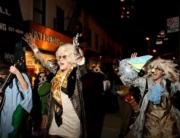Even if you can’t name off the top of your head hits by the band Journey, as soon as one of their songs cranks up—on Glee, in the mall, let alone the title song in this entertaining documentary—you are singing along with the familiar choruses. You’re not alone, so are millions of fans all over the world, including a guy in the Philippines who could belt them out so enthusiastically that his No. 1 fan uploaded his cover versions to YouTube. That’s where, late one night on a computer in San Francisco, the band found Arnel Pineda when they were searching for a lead singer, their fourth since the late 1970s.
It’s an improbable feel good yarn, and that’s one level for audiences to enjoy it, like the Oscar-winning documentary Searching for Sugar Man. Fans of Journey will, of course, want to see the clips and interviews with band members, particularly the philosophical perspective of founding guitarist Neal Schon on how they have shrewdly reinvented themselves several times since the 1980s.
Don’t Stop Believin’: Everyman’s Journey also becomes a heartfelt verité portrait of American pop rock as a global product, reaching into the slums of Manila, and filling stadiums around the world with happy, smiling people. While Journey doesn’t have the political or musical cachet of the likes of the Beatles, who are said to have rocked the Kremlin during the Cold War, it is astonishing to see the ubiquity and popularity of their songs, and Arnel is the band’s charmingly wide-eyed and enthusiastic ambassador.
Director Ramona S. Diaz goes beyond the similarities behind Stephen Herek’s Rockstar (2001), about the replacement singer for the band Judas Priest. She first heard about Arnel when she was forwarded “Best US Embassy Visa Application Story I’ve Ever Heard,” about his audition. Arnel walks her past the school where he had to drop out, the small house his family was evicted from, and street kids, like he used to be when he struggled to support his younger, orphaned siblings. He describes how he used his prodigious singing talent first for begging before getting hired for funerals and clubs in Manila. At one point, he was on the verge of breaking into the big time with his own songs in Hong Kong, but he was felled by the usual rock ‘n’ roll demons. Finally in a stable romantic relationship, he was already grateful to find employment back home as a singer in a Journey cover band when he received an email he was sure was a hoax.
Then the suspense starts. Even if the understandably nervous Arnel can convince the band members and their manager that he—a short, very long-haired Asian guy—can sing those familiar songs (they weren’t even sure he could speak English), can he really be accepted by the fans of a quintessential American band?
On the summer 2008 tour, Arnel amazingly becomes a quick study in taking over a stadium stage, coping with the behind-the-scenes drudgery of taking care of his voice and singing though sick—the show must go on. The concerts had all the potential to be one of those oldies shows or an imitative tribute band, but something magical happens—Arnel’s joie de vivre is not only accepted by the fans (after some express trepidation out in the parking lots), but reenergizes the older band members on stage, and inspires new songs. (Drummer Deen Castronovo, himself a 1998 replacement, chuckles: “He’s like David Lee Roth and Bruce Lee put together.”)
The enthusiastic stadium tours shown here demonstrate that the new band member has creatively expanded Journey’s brand of optimism to new markets around the world at a time when recordings and radio are declining. With various fundamentalist and dictatorial governments recently trying to tamp down on the Harlem Shake, maybe having more people around the world singing and dancing together to Journey’s hits contributes to progress in freeing more minds and bodies. You’ll certainly come out of the theater humming.







Leave A Comment